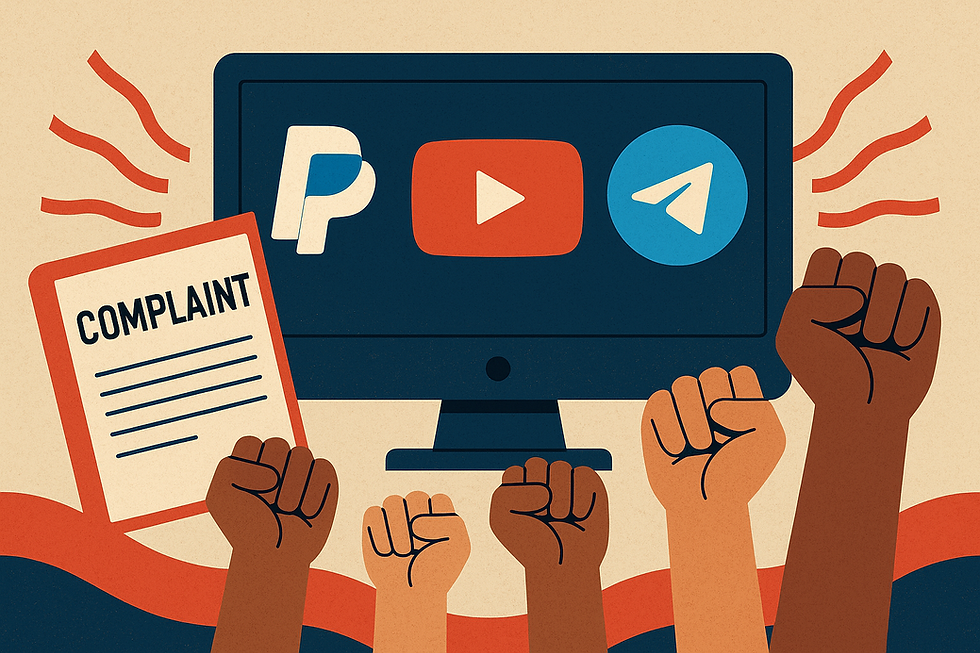When Digital Giants Turn a Blind Eye: PayPal, YouTube, Telegram, and the Cost of Neglected Complaints
- Dr. Wil Rodriguez

- Aug 5
- 3 min read
By Dr. Wil Rodríguez, for TOCSIN Magazine

The Noise of Silence
You did everything right: reported abuse, submitted documentation, followed the steps. And what did you receive in return? Silence. Or worse, a templated auto-reply that reads like a dismissal wrapped in corporate politeness.
This is not a glitch. This is not delay.
This is a pattern. A system.
When platforms like PayPal, YouTube, and Telegram neglect legitimate user complaints, they are not being overwhelmed—they are being complicit. Their silence is not accidental; it is engineered.
PayPal: When Your Money Disappears, So Does Their Accountability
For a company that moves billions, PayPal has a disturbing history of freezing funds without explanation, locking users out, and refusing to offer timely resolution.
Class Action & Arbitrary Freezes
A 2022 class-action lawsuit accused PayPal of seizing customer funds and refusing to explain why—forcing users to obtain subpoenas to even understand what rule they allegedly violated.
Users Left in the Dark
One Reddit user summed it up:
“PayPal just keeps sending the same message. It’s like talking to a wall while your money bleeds out.”
Global Outage, Zero Support
In August 2025, a global outage locked out thousands. Some, like a renter who lost $860 in transfer, still haven’t been reimbursed. The platform? Silent.
This is not just about money. It’s about power—and the utter absence of accountability when that power is abused.
YouTube: Algorithmic Abuse, and a Wall of Indifference
YouTube’s power to recommend content shapes public consciousness. But when that power goes wrong, it rarely admits fault.
Ignoring Complaints on Toxic Content
Thousands have reported misleading, harassing, or inappropriate content—only to be met with silence or vague policy quotes. Creators find no clear appeals process, while bad actors thrive in the algorithm’s shadow.
Mozilla’s “Regret Report”
In a study of over 2,700 users, 71% of video regrets came from YouTube’s recommendations—not from searches. Complaints didn’t lead to change. Users described the process as “shouting into the wind.”
YouTube doesn’t just ignore complaints. It builds systems that pretend to listen—while continuing to prioritize engagement over safety.
Telegram: A Platform for All—Including Criminals
Telegram’s model of “hands-off freedom” has turned it into a haven for extremism, exploitation, and unchecked abuse.
Ignoro mg Governments, Not Just Users
Australia fined Telegram nearly $1 million for ignoring official reports of child abuse content.
France indicted CEO Pavel Durov after 2,460 unresponded legal requests linked to exploitation and criminal activity.
South Korea and Vietnam launched investigations and access restrictions due to Telegram’s failure to act on harmful content.
Telegram doesn’t lack capacity—it lacks will. While users and governments demand accountability, Telegram retreats behind its opacity.
What Happens When Complaints Vanish?
Victims suffer twice: once from the harm, then from the silence.
Criminals remain emboldened.
Trust in platforms erodes at its core.
These are not isolated failures. They are symptoms of an industry designed to deflect, delay, and deny.
What Users Can—and Must—Do
Document everything: dates, screenshots, correspondence.
Go public: publish your case, tag platforms, share the story.
Use legal/regulatory channels: GDPR, consumer protection, digital rights NGOs.
Join or launch collective actions: you’re not alone—speak louder together.
Author’s Reflection: The Cost of Digital Silence
I didn’t write this because I’m angry—I wrote this because I’ve been silenced.
I’ve filed the reports. I’ve sent the emails. I’ve waited the weeks, then the months. And I’ve watched—like so many of you—as platforms that profit from our presence choose inaction over integrity.
This is not just about glitches or algorithms. It’s about a deeper moral failure: a world where victims are ignored, abusers are left unchecked, and trust becomes collateral damage in the business of attention.
But I refuse to be quiet.
If you’re reading this and you’ve been ignored, minimized, or dismissed by these digital giants—know this:
Your complaint was real. Your voice still matters.
What they call “a delay” is your time, your money, your safety.
What they treat as “just a policy” is your humanity being neglected.
Let’s write, speak, organize—and refuse to normalize digital abandonment.
📣 TOCSIN Magazine: A Call for Unheard Voices
TOCSIN was built for moments like this—when systems fail and silence becomes its own violence.
We invite readers, whistleblowers, creators, and survivors to share their stories.
Let your story be heard. Let your complaint become a signal.
Because the more we speak, the less they can pretend they didn’t hear us.
Go to: tocsinmag.com
The age of silence is ending.
The age of accountability is just beginning.
— Dr. Wil Rodríguez





Comments